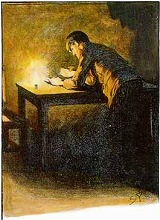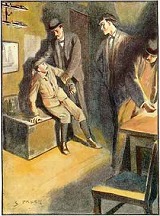It was a long and melancholy vigil, and yet brought with it something of the thrill which the hunter feels when he lies beside the water-pool, and waits for the coming of the thirsty beast of prey. What savage creature was it which might steal upon us out of the darkness? Was it a fierce tiger of crime, which could only be taken fighting hard with flashing fang and claw, or would it prove to be some skulking jackal, dangerous only to the weak and unguarded?
In absolute silence we crouched amongst the bushes, waiting for whatever might come. At first the steps of a few belated villagers, or the sound of voices from the village, lightened our vigil, but one by one these interruptions died away, and an absolute stillness fell upon us, save for the chimes of the distant church, which told us of the progress of the night, and for the rustle and whisper of a fine rain falling amid the foliage which roofed us in.
Half-past two had chimed, and it was the darkest hour which precedes the dawn, when we all started as a low but sharp click came from the direction of the gate. Someone had entered the drive. Again there was a long silence, and I had begun to fear that it was a false alarm, when a stealthy step was heard upon the other side of the hut, and a moment later a metallic scraping and clinking. The man was trying to force the lock. This time his skill was greater or his tool was better, for there was a sudden snap and the creak of the hinges. Then a match was struck, and next instant the steady light from a candle filled the interior of the hut. Through the gauze curtain our eyes were all riveted upon the scene within.

The nocturnal visitor was a young man, frail and thin, with a black moustache, which intensified the deadly pallor of his face. He could not have been much above twenty years of age. I have never seen any human being who appeared to be in such a pitiable fright, for his teeth were visibly chattering, and he was shaking in every limb. He was dressed like a gentleman, in Norfolk jacket and knickerbockers, with a cloth cap upon his head. We watched him staring round with frightened eyes. Then he laid the candle-end upon the table and disappeared from our view into one of the corners. He returned with a large book, one of the logbooks which formed a line upon the shelves. Leaning on the table, he rapidly turned over the leaves of this volume until he came to the entry which he sought. Then, with an angry gesture of his clenched hand, he closed the book, replaced it in the corner, and put out the light. He had hardly turned to leave the hut when Hopkins’s hand was on the fellow’s collar, and I heard his loud gasp of terror as he understood that he was taken. The candle was relit, and there was our wretched captive, shivering and cowering in the grasp of the detective. He sank down upon the sea-chest, and looked helplessly from one of us to the other.

“Now, my fine fellow,” said Stanley Hopkins, “who are you, and what do you want here?”
The man pulled himself together, and faced us with an effort at self-composure.
“You are detectives, I suppose?” said he. “You imagine I am connected with the death of Captain Peter Carey. I assure you that I am innocent.”
“We’ll see about that,” said Hopkins. “First of all, what is your name?”
“It is John Hopley Neligan.”
I saw Holmes and Hopkins exchange a quick glance.
“What are you doing here?”
“Can I speak confidentially?”
“No, certainly not.”
“Why should I tell you?”
“If you have no answer, it may go badly with you at the trial.”
The young man winced.